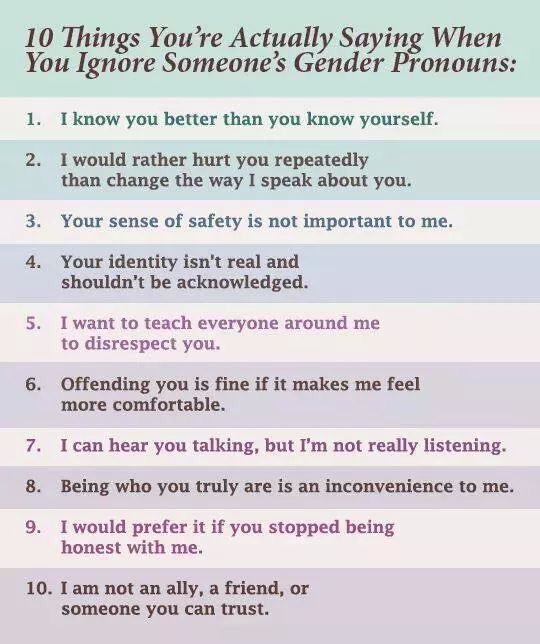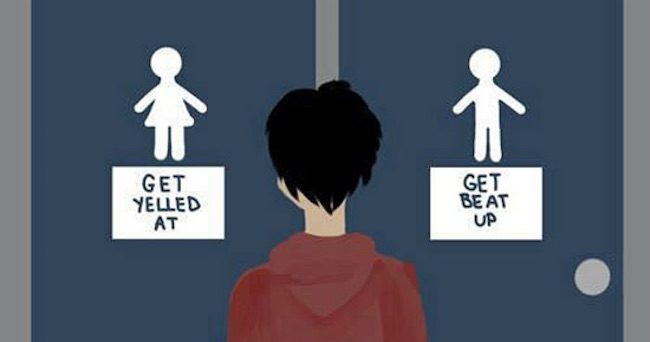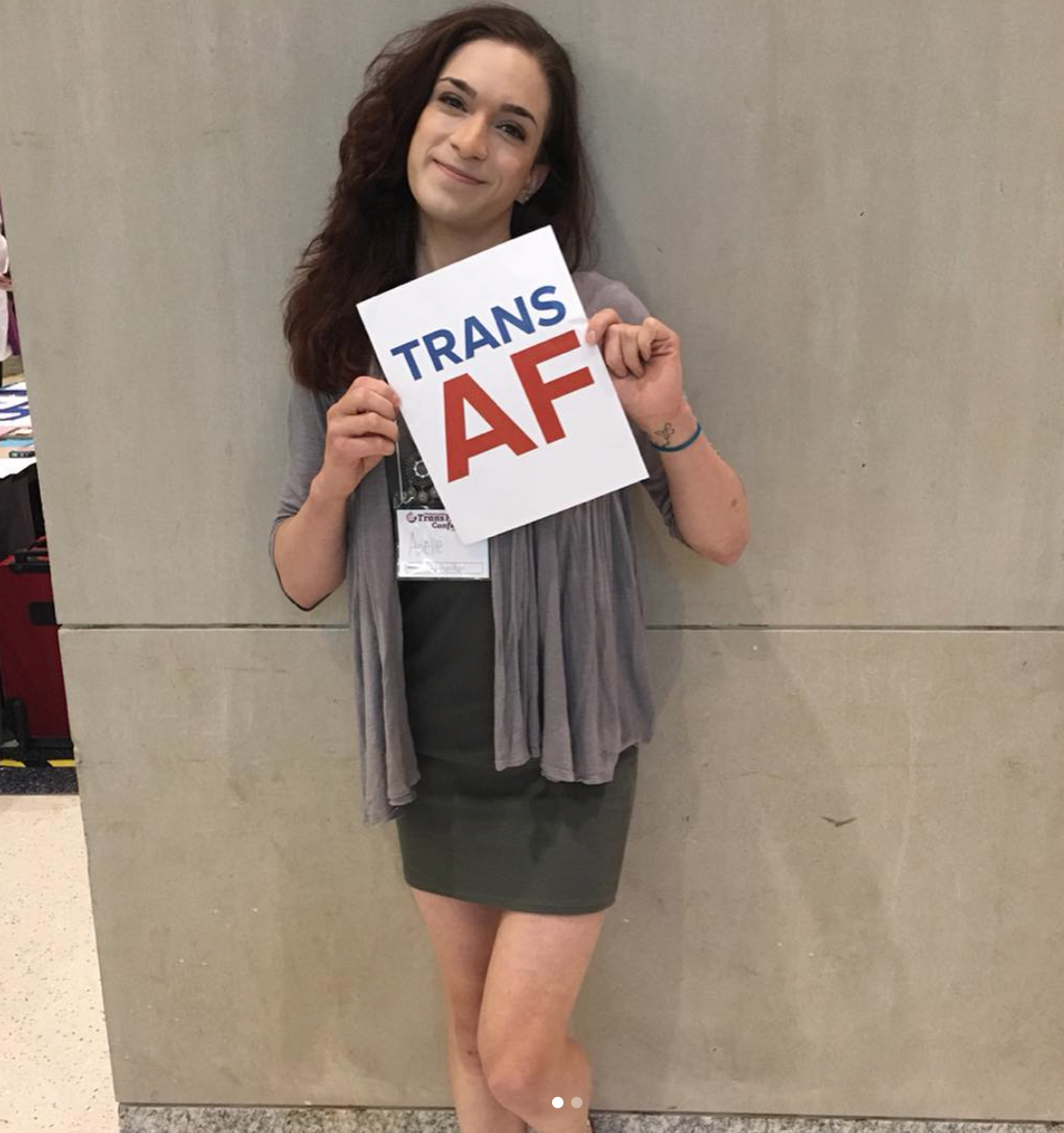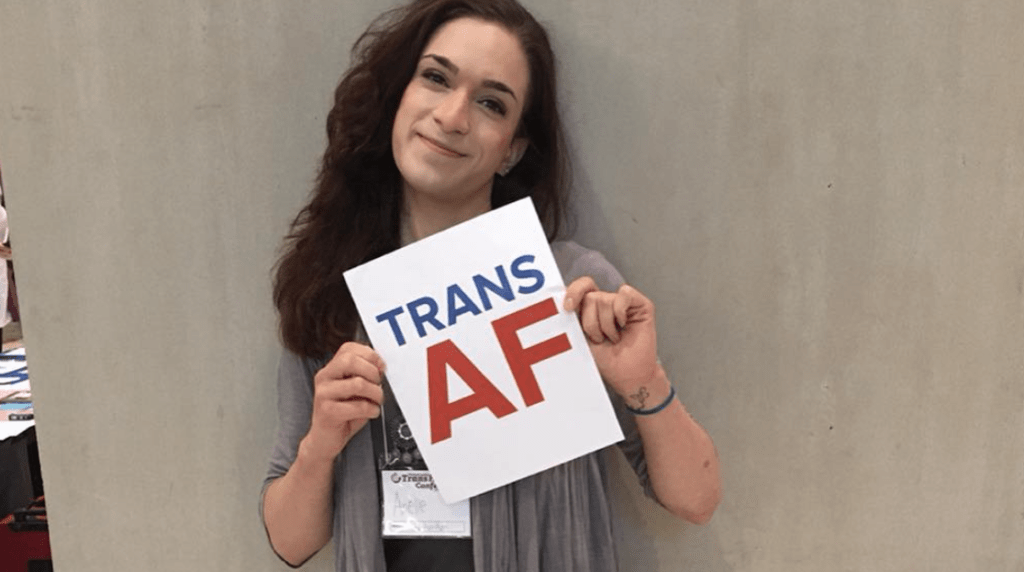Being part of a marginalized community means enduring numerous aggressions at the hands of those around us. The “major” aggressions that make the news are mostly macro-aggressions – acts like physical or verbal assault, rape, murder, verbal harassment, and intimidation – because it is well understood that these acts cause immense and often irreparable harm. While trans people (and other marginalized peoples) do experience these acts at a rate disproportionate to the general population, a large portion of the emotional burden placed on marginalized communities comes in the form of smaller, more frequent aggressions known as micro-aggressions.
While these acts do not individually inflict anywhere near the same degree of harm as macro-aggressions, their impact compounds over time. When other people witness us facing these aggressions in a single fleeting instance, they may interpret our reactions as overreactions. And if that individual micro-aggression were the only one we were forced to endure, maybe I would agree with them. Unfortunately, micro-aggressions rarely occur as isolated incidents. Instead, they occur as frequent and ongoing frustrations and triggers that wear us down over time as we battle to live our everyday lives. Micro-aggressions may be verbal, behavioral, or environmental and either intentionally or unintentionally communicate hostile, derogatory, or negative attitudes toward a certain group.
As a transgender person, I experience micro-aggressions daily, often at the hands of well-meaning cisgender people who simply do not know any better. The world is so profoundly lacking in adequate education about marginalized identities that people outside of a marginalized community may not even realize the impact nor the societal prejudice reflected in their words and actions.
I do my best to call out these daily injustices and to calmly explain why their words and actions are hurtful — but in a world that already demands a metric shit ton (which, according to a quick Google search is equivalent to 24 metric assloads) of emotional labor from women and from transgender people, calling out each and every micro-aggression on top of that is exhausting. That’s why I’ve created this handy dandy guide to some common micro-aggressions that myself and other trans people experience on the reg, complete with explanations of why these comments come across the way they do!
This is by no means an exhaustive list, and if you – a trans reader of my blog — have something you’d like to add, please let me know in the comment box at the end and I’ll add it in!
For your reading pleasure:
Misgendering or deadnaming us.
A trans utopia would be a world in which it was normalized across societies to ask which pronouns someone uses before using gendered pronouns or words to describe them. Since that is not the norm (yet!), many transgender people get misgendered regularly, especially trans people who are not read as their gender. Correcting everybody on our pronouns requires a ton of emotional labor, but it is often the only way for us to be gendered correctly.
While some transgender people choose to keep the same name after transition, many others do not. The act of using someone’s birth name instead of the name they use is called deadnaming, and it really fucking hurts. Even after being out for five years, getting misgendered or deadnamed still hits me like a punch in the gut. It can shake me from totally fine to on the verge of tears in seconds. You can imagine how this pain can compound for people who are misgendered and/or deadnamed multiple times daily.
It is one thing to misgender or deadname someone when you do not realize what their name and pronouns are. While I would love asking someone’s name and pronouns when you meet them to be the norm, I understand that most of us have been taught our entire lives that is acceptable to assume someone’s gender, and I know that it will take a while for us to unlearn that behavior. It is significantly worse to misgender or deadname someone who has already corrected you on their name and pronouns. I could explain further, but queer writer and mental health advocate Sam Dylan Finch has already done so quite eloquently in his 2014 article 10 Things You’re Actually Saying When You Ignore Someone’s Gender Pronouns:

Here are some ways that you can begin to actively unlearn gender assumptions and combat them in everyday life:
Introduce yourself using your name and pronouns (“Hi, I’m Arielle, and I use she/her pronouns”) or ask what pronouns people use when meeting them.
I understand that becoming comfortable doing this when you meet somebody is a process, so while you work on that, an alternative is to wait for somebody a person trusts to use gender pronouns for them, or to wait for someone to tell you their pronouns.
If you need to use pronouns for somebody before finding out their gender pronouns, best practice is to use gender neutral pronouns – such as they/them/theirs pronouns – until you know which ones they use. Do this for everybody you meet, not just for people you believe might be transgender, since there is no way to know if somebody is transgender/gender non-conforming simply by looking at them.
Once somebody has told you their name and pronouns — whether you asked, or whether you used the wrong ones and they corrected you — please use them. A trans person’s name and pronouns is not something to be taken lightly — if a trans person has trusted you to be in their life, it is your responsibility to make sure you respect their identity fully and completely.
If you have confirmed that the trans person in question is out to everybody (and not just out to you or a select few), take it upon yourself to call out others for incorrectly naming or gendering that person.
Using terms like: “a transgender,” “transgenders,” or “transgendered”
The term “transgender” is an adjective, not a noun. Therefore, someone can be transgender (trans, for short), or you can say that somebody is a transgender woman/trans woman, a transgender man/trans man, or just a transgender person/trans person. To say that someone is “a transgender” is not only grammatically incorrect (articles like “a” only go in front of nouns), but referring to someone this way also reduces them simply to their identity. By stripping them of the nouns man, woman, or person you are unintentionally implying that their transness is the sole or most important identifying factor about their identity.
Since transgender is not a noun, it cannot be made plural, which is why saying “transgenders” is incorrect. It is also not a verb, nor is it something that happens to someone (which are the two instances in which you would add the suffix “-ed”), so saying “transgendered” is incorrect. In the same vein that you would not say that Elton John “gayed” or “is/has gayed,” you would not say that someone “transgendered” or “is/has transgendered.” When people use “transgendered” as a verb, what they often mean to say is “transitioned,” which is the process of aligning one’s gender presentation with their internal experience of gender.
“You’re trans? But you’re beautiful!“
While most people mean this is a compliment, I do not take it as one. This phrase implies that it surprises them that they perceive a transgender person as beautiful.
We may not always fit into the unrealistic and unattainable conventional beauty standards that our ciscentric society sets forth for women (nor do most cis women, which is why we airbrush pores and waistlines into nonexistence), but that does not mean that trans people aren’t beautiful — on the contrary, we are fucking radiant. To have the courage to come into your authentic self in a world that tries each and every day to make you somebody else reflects a beauty beyond anything society at large has been able to quantify. Look up #TransIsBeautiful on Instagram for evidence of our boundless beauty.
“What is your real name?” or “What is your birth name?”
My real name is the one that I give you when I introduce myself. My birth name is irrelevant – it was assigned to a person of a gender with which I do not identify.
Asking this question implies that you do not see my affirmed (chosen) name as “real.”
Furthermore, if you know a trans person’s birth name, please keep it to yourself. Too often, I hear people tell stories that start with, “Well, this was back when Janet went by Jason.” NO! Stop. Put that dead name back where it came from. The only person who is allowed to share a trans person’s dead name is the person to whom that dead name once belonged.
“Have you had *wink wink* ‘The Surgery?'”
When people ask this question, they are asking about bottom surgery — basically, they’re asking me to disclose, in no uncertain terms, the shape of my genitals. They might as well scream, “ARIELLE, DO YOU HAVE A VAGINA?” No, I don’t, but I don’t really need my morning regular “Tall Mocha Nonfat No Whip Three Equals Kids Temperature” to know that.
Just as it would be extremely inappropriate and invasive to ask a cisgender person about their genitals, it is equally so with transgender people. I’m unclear what gave people the idea that this is a reasonable question to ask, but it is not, and it makes most trans people extremely uncomfortable.
(But side note, #Vagina2021)
“Are those real?” while looking at my boobs.
So, fun fact, estrogen can make anybody grow boobs. So when I started taking estrogen, I started growing breasts the same way that many AFAB (assigned female at birth) people do when they hit puberty.
I’ve come to understand that many people believe the only way a transgender woman can have breasts is if she has top surgery, but this is not true.
Regardless, the same general rule applies here as with the “bottom surgery” question — if it would be inappropriate to ask a cisgender person, it is also inappropriate to ask a transgender person.
Please note that in posting this clip, I am in no way supporting the show Seinfeld, which regularly used queer and trans people as punchlines. This clip, however, was just too fitting for this topic.
——–
“It’s a process for me, too!” and “You just have to be patient, cut me some slack!”
I want to be really clear about the regard in which this is a micro-aggression.
I understand that a trans person’s loved ones must go through their own process of adjusting to a new name and pronouns, growing to understand what’s expected of them as someone who cares about a trans person, and learning how to accept and support their loved one. However, it is unfair to expect the trans person in question to bear the emotional burden of their loved ones’ anxieties about their transition. It is unfair to expect them not to react when that person misgenders or deadnames them. Coming out and beginning a transition is stressful enough without also having to do the emotional labor of your parents and friends.
If you are someone who loves a trans person, please avoid demanding additional emotional labor of that person by compelling them to help you through your process of accepting them. I urge you to do your own research, search for available support groups and resources designed for trans people and their loved ones, find books and movies about transgender lives, and maybe even reach out to transgender friends if you’re lucky enough to have them. While you’re going through your process, assure your transgender loved one that you love them no matter what and will support their happiness.
“I’ve always wanted a trans friend!”
This is usually intended as a compliment, but it just makes me feel tokenized. It makes me feel like the only reason they want to be my friend because I am transgender, and that the most special thing about me to them is my transness. It also triggers concern that I will be required to perform immense emotional labor in teaching them how to be a trans ally — because if they don’t have any other trans friends, it’s likely that they aren’t super well-versed in trans allyship.
“Why would you want to be a girl?”
I don’t want to be a girl, I simply am one. I don’t have a choice in the matter any more than a cisgender person does. Honestly, being a woman kind of sucks sometimes, but it’s who I am. The only choice a transgender person has is between hiding their gender and staying in pain, or coming out and giving themselves a chance at happiness.
Saying this to a trans person invalidates their identity because it implies that our affirmed gender is a choice rather than something that simply is.
“Do you know [name of other trans person]? They’re also trans.”
Yeah, obviously! I see them at all the meetings! We’re plotting a coup of the cishetero patriarchy.
Just kidding! Just because somebody else is trans does not mean that we automatically know each other. Nobody would assume that all LARPers know each other (they don’t), or all investment bankers (they don’t), or all baristas (okay, we kind of do). Sharing one attribute does not magically bring people together across space and time.
Also, please don’t out your trans friends to me unless they’ve given you explicit permission to do so.
“Ladies and gentlemen”
When you address a group of people as “ladies and gentlemen,” you automatically exclude and invalidate the identity of anybody that does not identify as male nor female. When you do this in a large group, it is incredibly likely that you are misgendering at least one if not multiple people — heck, the automated subway announcer voice alone misgenders hundreds of New Yorkers each day by doing this.
Addressing a group of people as either “ladies” or “gentlemen” runs the same risk, because unless you know how each person in that group identifies, you are likely misgendering someone. The amount of times that I’ve been in a group with a few women and one or two nonbinary people who are read as female and been referred to by waitstaff as “ladies” is appalling. Trans people do not typically feel empowered to correct each and every person who misgenders us, because doing so each time is far too much emotional labor for one person to perform — so even if no one has called you out for misgendering them, rest assured that assuming the gender of everyone in a group is the quickest way to be sure that you’ll misgender someone everyday.
As an alternative to gender-specific forms of address, here are some trans-inclusive ways to address a group:
- Folks
- Friends
- Comrades (but only if you’re a proud communist)
- Assembled guests
- Distinguished/esteemed guests
- Colleagues
- Y’all
- My dears
- Friends
- Pals
- Everybody
- All assembled
- Honestly, I frequently enter a room with, “What’s up, fellow queers?!” but that’s probably only acceptable if you’re queer
- Foolish mortals
Gendered bathrooms & locker rooms
These are frustrating for a number of reasons. First off, gender-segregated bathrooms make it incredibly scary to use the bathroom. For folks who are non-binary (and therefore don’t typically feel quite at home in a restroom labelled “men” nor one labelled “women”), choosing a restroom can feel like a losing battle, forced to choose between two invalidating options. For both non-binary and binary transgender folks, choosing to enter a binary restroom can be incredibly dangerous — when choosing to use the men’s room, trans feminine people are at an elevated risk of being attacked for being transgender. In the women’s room, we are at a greater risk of getting yelled at, humiliated, chased out, and often still being attacked.
Some trans people choose not to leave their homes unless they know that they will be near an inclusive restroom, which can be hard to come by, especially in an age where the thought of trans people using the same bathroom as cis people was enough to make Republicans push for anti-trans bathroom bills in nineteen states between 2015 and 2018. The fear and anxiety induced by the prospect of harassment or assault in gendered restrooms causes many transgender people to avoid using public restrooms altogether. As a result, trans people experience higher incidence of UTIs and bladder infections than cis people.

The fact that bathrooms are still gendered at all is a tad baffling, and here’s a super informative article on why bathrooms became gender-segregated in the first place.
And finally, “You don’t look transgender!”
Oh, I’m sorry, let me just …

On a serious note, when you say this, you make us feel like it’s a bad thing to be read as trans, which it is absolutely not. Sure, many of us – myself included – have for years been taught by those around us that trans people are only valid to the degree that we are read as the gender with which we identify, but this is absolute hogwash (Honestly I have no idea why I just wrote “hogwash” but my fingers decided to type it and I just let it happen). A trans person’s identity is valid no. matter. what.


Loved this post— thank you for writing it! Small suggestion— please consider using “general rule” instead of “rule of thumb”. The phrase “rule of thumb” comes from an old law that allowed men to beat their wives, as long as the stick was no thicker than the width of their thumb. Even in a small way, using the phrase perpetuates violence and patriarchy.
Great read, Arielle. Thank you!
Thank you so much for this feedback! I’ll make that change as soon as I get home. Weirdly enough, my roommate made the same comment about my use of that phrase. Just curious, was that on a tv show or something recently where you both would have seen it?
I am reading this in one of my lectures right now, and I just laughed out loud (while my teacher was lecturing) when I read the definition for metric shit-ton lol. And then again at the plotting of the “coup of the cishetero patriarchy.” Lmao, seriously made me laugh.
On a real note, you wrote this journal absolutely eloquently! I am sending it over to my family to read as well since they want to educate themselves on this topic as well. Seriously, this was a great read Arielle! Keep it up 🙂
I cant wait to wait to walk into a room and greet everyone with: Hello, foolish mortals.
I have MS. I feel absolutely awful 90% of the time and despite an occasional limp in my gate, I look like everyone else, yet people tell me all the time, “But you don’t look sick! It’s enraging.
So, how is this any different? I can’t address my illness physically/outwardly short of wearing a name tag or shirt that says “I have MS”. If I’m not in a wheelchair or using a walker, it’s not obvious. There is no cure, it’s chronic, I’ll have it forever and it could very Well kill me unless medical science can come up with a cure. So, it’s not the kind of thing I necessarily want to have in depth conversations about. Then again, that’s not necessary because having MS doesn’t define me.
I’d really appreciate hearing an opinion about this as it pertains to this conversation. Thank you.
It’s definitely a similar frustration! Microaggressions affect many marginalized communities — not just transgender people. I can only imagine how enraging it must be to feel so awful so much of the time and have to deal with people telling you that you don’t look sick. I don’t have any sort of chronic illness, so obviously your experience is different than mine, but we’re both dealing with micro-aggressions that reflect a societal misunderstanding of our experiences within marginalized groups — for me, that group is trans people. For you, it’s people with MS/people with chronic illnesses.
Thanks Arielle. I don’t feel marginalized per se, more misunderstood because so few people take the time to wrap their heads around what MS is (and isn’t). I would imagine that must be what it’s like in the trans community.
When someone says to me to me that I don’t look sick, I don’t consider that be to be a micro aggression. It’s more like they’re demonstrating their ignorance and lack of empathy. It takes some audacity to say something like that to someone in the first place.
Maybe we’re breaking ground here and talking about the exact same thing, only using different verbiage.
Thanks again.
Strive to be happy..
It does sound like we’re saying something similar with different verbiage, which is totally okay! I would argue that demonstrating ignorance and lack of empathy IS a micro-aggression, but it’s okay if you wouldn’t use that word for it.
Pingback: Transgender at Work: What I’ve Learned About Transgender Advocacy and Education in the Workplace – Trans and Caffeinated
I just started reading your blog and i am impressed with your work! People are so oblivious to these micro-aggressions so i’m glad you’ve listed them out here in such a clear and concise way. Thank you
Pingback: I Do Not Have To Perform Your Emotional Labor – Trans and Caffeinated
Pingback: When You Say that We're “Asking for Too Much Too Fast” — Trans & Caffeinated
Pingback: Dating While Trans: The Troubling, Often Demoralizing Reality • Trans & Caffeinated
Pingback: Powerful Lessons I've Learned About Trans Advocacy and Education in the Workplace • Trans & Caffeinated